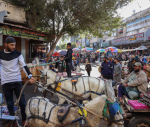Preparations for holding the Geneva II peace talks on Syria have been on a roller coaster from the very beginning, almost two years ago.
The latest wavering decision was that of UN Secretary General Ban Ki-moon, who on Sunday extended an invitation to Iran to attend the conference, set for today, without prior consultation of the key players.
The next day the UN withdrew this invitation, upon pressure from the Syrian opposition who threatened to boycott the meeting, as well as from the US and other Western nations also taking part in the international efforts to end the Syrian conflict.
Why this fumble no one knows for sure.
Russia wanted Iran to be included all along; so did the UN-Arab League envoy Lakhdar Brahimi.
The UN secretary general explained his change of position by saying that there are conflicting signals from Iran on whether it will support the aim of Geneva I conference, held almost two years ago.
This latest episode does not bode well for the conference.
If the criterion for taking part in Geneva II is accepting in advance the outcome of Geneva I, which is only legitimate and reasonable, there is the assumption that all would-be participants agree on this issue.
Moscow is on record as not supportive of the exclusion of Syrian President Bashar Assad from the future political landscape of his country.
But could any logical person or power suggest that Russia be excluded from the peace talks?
It makes more sense not to confine the discussions to like-minded governments.
It would have been the role of the majority to convince the minority to go along with the aim of establishing a transitional government in Syria, in preparation for holding fresh presidential and parliamentary elections based on international norms and under the supervision of the UN.
Since Tehran, like Moscow, is a staunch supporter of the Assad regime, the talks in Geneva seem to be doomed before they start.












